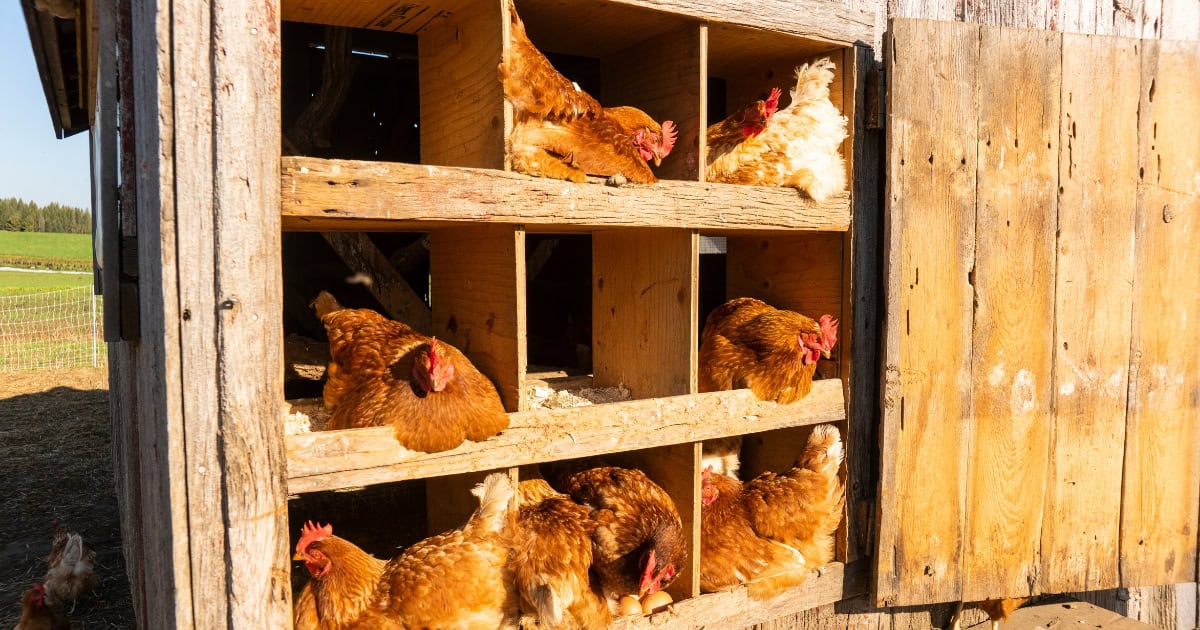Chickens
Can You Have Chicken Coops in a Residential Area?
Can you have a chicken coop in a residential area?
I’m Toni, your friendly neighbourhood pet lover. As a proud owner of backyard chooks, I know how much joy they can bring to our lives.
But before setting up a coop yourself, you need to understand the local regulations and considerations that come with keeping backyard chickens in Australia.
So, can you have a chicken coop in a residential area? Let’s explore the world of residential chicken keeping together!
- Can You Have a Chicken Coop in a Residential Area?
- Essential Considerations Before Buying a Chicken Coop
- Choosing a Chicken Coop for Residential Areas
- Health and Safety Guidelines for Backyard Chickens
- Legal Implications of Owning Chickens in Residential Areas
- Benefits of Having a Chicken Coop in a Residential Area
- Challenges and Solutions for Urban Backyard Coops
- Toni’s Wrap
Can I Keep Chickens in My Neighbourhood?
Before you start building your backyard chicken coop in Australia, it’s crucial to familiarise yourself with the local council regulations.
These rules can vary depending on the council, so it’s essential to do your research and ensure compliance.
When I first considered keeping chickens in my residential area, I reached out to my local council for guidance. I quickly learned that each council has its own set of regulations regarding the number of chickens allowed,
if you can have roosters, coop size, and placement on the property. Some councils even require permits or have specific guidelines for waste management.
Failing to adhere to these regulations can result in fines or even the removal of your chickens. It’s not worth the risk, so take the time to thoroughly understand your local council’s requirements before proceeding with your chicken-keeping plans.

Essential Considerations Before Buying a Chicken Coop
Once you’ve familiarised yourself with the local council regulations, there are several key factors to consider before building your chicken coop.
These considerations will help ensure that your chickens are happy, healthy and not a nuisance to your neighbours.
Space and Location
When choosing the size of your chicken coop, consider if your flock will live inside their coop full time or whether they will only be inside their coop for a short time overnight and free range during the day.
When choosing a location for your chicken coop, consider your available backyard space. Each chicken will need 1-2 square metres of exercise space.
Additionally, select a location that is well-drained, provides shade during summer months and is protected from strong winds.
Neighbours
When keeping backyard poultry, you need to consider your next door neighbours. Discuss your plans with them early on and address any concerns they may have. Assure them you will maintain a clean and well-managed coop.
Avoid placing the coop too close to your neighbours’ property to minimise noise and odour concerns.
In some cases, it may be helpful to share some fresh eggs with your neighbours as a goodwill gesture.

Choosing a Chicken Coop for Residential Areas
When choosing a chicken tractor or coop for a residential setting, it’s important to strike a balance between functionality and aesthetics. A well-designed coop not only keeps your chickens safe and comfortable but also complements your backyard.
Functionality and Comfort
Your chicken coop should provide a safe and comfortable space for your chickens to rest, lay eggs and seek shelter from the elements. Key features to include are:
- Proper ventilation to regulate temperature and prevent moisture buildup.
- Adequate roosting bars for your chickens to perch on at night.
- Nesting boxes for egg-laying.
- Easy access for cleaning and maintenance.
- Predator-proof construction to keep your chickens safe.
Aesthetics and Blending In
To help your chicken coop blend in with your residential setting, consider using materials and colours that complement your home and backyard. For example, you could paint the coop to match your house or use weather-resistant wood stains for a natural look.
Planting shrubs or tall grasses around the coop can also help it blend into the landscape while providing additional shade for your chickens.
Check out some tips from our customers here.

Health and Safety Guidelines for Backyard Chickens
Chicken coop safety will involve both monitoring the health of your girls plus keeping coop waste to a minimum.
Chicken Health
To minimise the risk of disease transmission, follow these guidelines:
- Keep the coop and run clean and dry, regularly removing droppings and replacing bedding.
- Provide water and food in containers that are easy to clean and disinfect.
- Quarantine any new chickens before introducing them to your existing flock.
- Watch for signs of illness, such as lethargy, decreased egg production or respiratory issues. Consult an animal veterinary specialist if necessary.
Waste Management
Proper waste management is essential to maintain a healthy environment for your chickens and prevent odours or pest issues.
Regularly remove droppings from the coop and run, and consider composting the waste or disposing of it according to your local council’s guidelines.
When cleaning the coop, use a natural, biodegradable cleaner to avoid harsh chemicals that could harm your chickens or the environment.
Before choosing chicken coops, check your city council’s rules as they vary widely.
Talk to your neighbours and ensure the coop is clean, well-placed and doesn’t bother anyone.
Design it to be safe, comfortable for chickens and in harmony with your backyard aesthetics.
Legal Implications of Owning Chickens in Residential Areas
Before you start building your backyard chicken coop, it’s crucial to understand the legal aspects of keeping chickens in a residential area. Local council rules vary when it comes to raising chickens and non-compliance can lead to fines.
Researching Local Council Regulations
The first step is to research your local council’s specific rules regarding housing chickens. Some councils may limit the number of chickens you can keep, while others might have restrictions on roosters due to noise concerns.
Make sure you’re in the know with these laws to sidestep potential trouble down the line. In my experience, I’ve found that most councils are supportive of small animals and birds, as long as you follow their guidelines.
When I first started raising chickens, I made sure to read through my local council’s website and even reached out to them directly with any questions I had. This proactive approach helped me ensure I was staying within the legal boundaries.
Potential Fines and Penalties
Failing to comply with your local council’s chicken regulations can result in fines or penalties. These can range from a simple warning to a hefty fine, depending on the severity of the violation. In some cases, you may even be required to rehome your chickens if you’re found to be in violation of the rules.
To avoid these legal consequences, it’s crucial to not only research the regulations but also to follow them closely.

Benefits of Having a Chicken Coop in a Residential Area
While navigating the legal aspects of backyard chicken keeping may seem daunting, the benefits of having a chicken coop in a residential area are well worth the effort.
As someone who has been raising chickens in my urban backyard for years, I can attest to the numerous advantages chooks bring.
Egg Laying
The most sought-after benefit of keeping chickens is fresh, nutritious eggs. Store-bought eggs can’t compare to the taste and quality of eggs laid by your own hens.
Plus, you have the satisfaction of knowing exactly where your eggs come from and that your chickens were well cared for.
You will also have a supply of free chicken manure for your garden.
Natural Pest Control
Local poultry are fantastic natural pest controllers. They love to forage for bugs and grubs, helping to keep your garden and yard free from pests.
You’ll rely less on nasty pesticides by encouraging nature’s own checks and balances right at home.
I’ve noticed a significant decrease in the number of slugs and snails in my garden since I started letting my chickens free-range during the day. They’re like little gardening assistants, happily munching away on any pests they find.
Educational Opportunities for Children
Raising chickens can be a wonderful educational opportunity for children. It teaches them about responsibility, animal care and where their food comes from.
Kids can even learn basic business skills if you decide to sell your extra eggs. You can involve your youngsters by teaching them how to collect eggs, raising baby chicks, or spending time cleaning out the coop together each week.
Silkies in particular make great companion animals for children.

Challenges and Solutions for Urban Backyard Coops
While the benefits of raising chickens in a residential area are numerous, there are also some challenges that urban chicken farmers may face.
However, with a little creativity and problem-solving, these issues can be overcome, allowing you to enjoy the rewards of backyard chicken keeping.
Dealing with Noise Complaints
One common challenge urban chicken farmers face is noise complaints from neighbours, particularly if you have a rooster. Roosters are known for their early morning crowing, which can be disruptive in a residential setting.
To mitigate this issue, consider opting for hens only, as they are much quieter than roosters. If you do have a rooster, try to minimise his crowing by providing a dark, enclosed space for him to sleep in at night.
In my experience, open communication with neighbors is key. Let them know about your plans to raise chickens and address any concerns they may have upfront.
Protecting Chickens from Predators
Another challenge in urban chicken farming is protecting your flock from predators. In residential areas, chickens can fall prey to snakes, foxes and domestic dogs.
For chicken safety, nothing beats the protection of a well-built coop paired with an enclosed run. Make sure your coop has a sturdy roof and walls that can withstand potential predator attacks.
Maintaining a Clean and Odour-Free Coop
Keeping your chicken coop clean and odour-free is crucial for the health of your chickens and to maintain good relationships with your neighbours.
Regularly cleaning out the coop floor and replacing bedding can help minimise odours and prevent the spread of disease. Remove uneaten food waste daily.
Use absorbent bedding materials such as straw, wood shavings or sugar cane mulch.
Proper ventilation is also essential to keep the air fresh and reduce moisture buildup.

Toni’s Wrap
So, can you have a chicken coop in a residential area? The answer is yes, but your local council probably has rules determining the number of chickens, if you can have roosters and where your coop can be located.
If you can make it work, having backyard chickens is an absolute joy. Fresh eggs, natural pest control and the opportunity to teach your kids where food comes from – it’s a win-win situation.
Just remember to do your research, choose your coop with care, and always prioritise the health and safety of your feathered friends. With a little bit of planning and a whole lot of love, you can create a beautiful backyard oasis that you and your chickens will adore.




